Latest Contributions
Read More Contributions
A Journey Through Life-3
Category:
Tags:
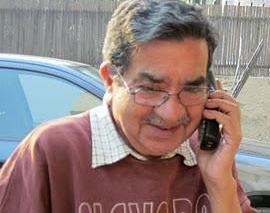
Jatinder Sethi was born in Lyallpur, now Faislabad, in pre-Independence India. He finished his M.A. (English) from Delhi University in 1956, and went off to London to study Advertising in 1958. He passed his Membership Exam of The Institute of Practitioners in Advertising (M.I.P.A) in1965, and joined Rallis India in Bombay. Later, for over 20 years, he worked for the advertising agency Ogilvy &\; Mather. Now retired, he helps his son in his ad agency in Delhi.
Editor's note: This is the third, and final, part of a three-part story. The first part of the story is available here, and the third part is available here. Part 1 ended with the Sethis leaving Cochin (now Kochi) on a ship for Europe. Part 2 ended with Mr. Sethi getting a job.
Preface
This is a story of a part of our journey through life. It is a journey of a couple, from student days through five decades of life together and work, and finally a retired life.
My wife gets a job
While shopping for steak at a shop in Camden Town, Uma, my wife was trying to find out how to choose a good piece for two people. There an African lady, who was waiting to be served, helped us to get the tender looking piece\; she also told us how to cook it. This lady, who had a very friendly and cheerful exposition, looked like a Gospel singer. During the conversation, she came to know that we were new to London, and my wife was looking for a job. The lady told us that she was a Supervisor in a factory, near Chalk Farm, and could employ Uma. Since next day was Sunday, not a work day, we were to go there on Monday morning. Janet, that's her name was, became quite friendly and, after shopping, she took us to her home for "a Cuppa of tea". Her home was near the Camden town Tube station.
In England, "Come on Love, let's have a cuppa\; kettle is on the boil" was the remedy for all problems. In any problematic situation, no matter how serious "Cuppa o tea", always ready, was the solution for English folks, who had gone through the trauma of so many wars. I think that's what taught them to laugh at themselves, and developed their sense of humour-even in the most troubled situations.
On Monday morning my wife went to the given address, and met Janet. Uma was introduced to the big Boss, an old fashioned, colonial type, who had been to India during the WW2, as a Tommy. He offered her 8 pounds a week as wages (English ladies were paid 12 Pounds). This factory was making all kinds of envelops, and worked on "Piece Basis". The advantage was that this was a basic wage, plus you could earn extra depending upon the quantity (pieces) you could produce, beyond the given-fixed numbers.
My wife did not think twice before accepting the job. She thought she would work extra hours and earn extra wages. She thanked Janet for her timely help. The factory timings were 6 in the morning to 3 in the afternoon. This was now late November 1958. It had become really cold. Leaving home at 5.30 am to reach at the factory at 6 am, needed great determination. Well, we had no other working option. Other folks were also working like that.
We however felt quite happy, as we both could leave together, since our working timings were the same. We would go to the same Swiss Cottage station to catch our trains. I would go North to Golders Green, and she would go South to Chalk Farm. It worked pretty well. We would happily get out of home together, wearing our overcoats, mufflers and caps. Well covered for the cold. Till one day ...
One morning, as usual we got up, had a bath, breakfast, took our packed lunch, kept ready at night, and left home for the station. It was pitch dark because of the thick fog, and you could not see your own hands. Holding each other's hand, we carefully walked and reached the station. There was not soul at the station at that time\; and even doors to the station were not open. We looked at the station clock!
The time was 3 am!
3am! This happened because we did not own a clock.
The first thing I did at my lunch time, after I reached my work place, was to go to Woolworth Store, and buy a Baby Ben Alarm Clock, and a small torch. I did not have even a wrist watch, which I bought later.
I change my job and house
There was another young Indian from Bombay, doing the same advertising course as me in the same college and same class. We became good friends. He was working in an advertising agency in its Production department. One day, I took a leave from my work, and went with him to the agency he was working. I was in my suit, bought from Alexander's Ready-Made, and red tie. He introduced me to his boss, the Manager -again an old Army guy who was posted in India during the Second World War. He offered me the same kind of job as my friend had, but paid me a little less than him-11 Pounds a week. I accepted his offer as it gave me an opportunity to work in a British advertising agency, which meant I could now appear for the Institute exam.
No doubt, it was one of oldest and old fashioned agency, headed by the Empire type bosses, who welcomed the natives from the colonies. It was called C. Mitchell &\; Co, and it was located right outside the Smithfield Market-the biggest steak, mutton and fish market. (While working at Mac Fisheries, I used to come here to buy Crabs and lobsters.) The famous Fleet Street was hardly at a stone's throw, with all its famous pubs.
When I informed my boss at Mac Fisheries, he let me go immediately, and was genuinely happy that I got the job in the profession I came to London for. The staff gave me a farewell, and a large piece of Turkey, as it was almost X-Mas time, and New Year - beginning of 1959.
I went to the shop opposite to whom I had sold my typewriter, months back, to say good-bye to him. He had become a good friend by now. He was glad for good turn of events for me. Now he did another good turn to me. He gave an introduction to another Landlady, much nearer Hampstead, who had an apartment available for rent.
My wife and I went to see the place. The Landlady showed us the flat. It was on the ground floor, with big bay windows facing the road. Two big rooms - a big drawing room, a big bed room, nice kitchen and bath. All well-furnished, Heating Systems working. No dampness, and no draught coming in from broken doors etc. The rent was high - 5 pounds a week, but we did not mind. It was about 10 minutes' walk from our present place-but near the Swiss Cottage station and Hampstead High Street. We paid the old Landlord, left the place instantly, and moved into the new place same night. The place we left was primarily used as welcome transit camp till you found a better place. That place was also always full, though, with new comers to London from India and Pakistan.
The letters we posted to our families shows our old address on Adelaide Road, and the new place, Belsize Avenue. There would be one more change later on.
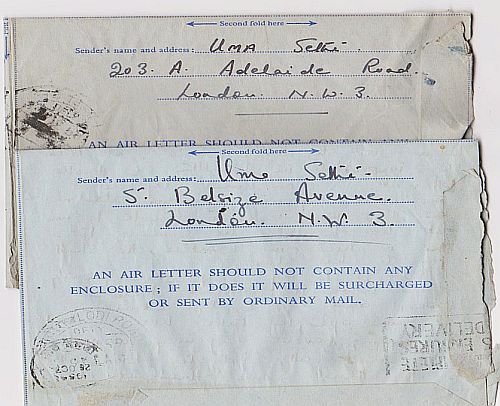
Our first and second address, London.
After settling down, we met the other people in the building. We were the only couple. All others were men, both from India and Africa. Seven in all, living on first and second floor. Very friendly and jovial, and a helpful group. They obviously had been there, it seemed, for a long time. The eldest man, about 43 years old, Hussan Mian, from Africa, seemed to be the mentor of all others. He had been trying to pass his Bar-at-Law exam from the Inn. He used to attend all the Dinners at the Inn but never appeared in the exams. His parents used to send the money regularly, and he was always flush with it. We all became like a family. They often requested my wife for Indian, homemade food. My wife always used to oblige, in fact felt happy to cook mutton and Roti for all.
My wife become pregnant
In 1959, Uma became pregnant - as planned. We all celebrated the news with lot of draft beer all around at the local Pub, with Hussan Mian almost acting like a god-father! Another young chap from Bombay, Altaf Alkazie, became a regular helper.
Since we were paying taxes, we had become, like all British people, entitled to all the benefits and privileges of the Welfare State of Great Britain. We went and registered at the Hampstead hospital near the Pond at the top of Heath. Thereafter, regularly, twice a week check up by the doctors was a must. Sometimes even the husbands were asked to attend the class to know how to treat your pregnant wife and how to help. The doctors were really very understanding and encouraging.
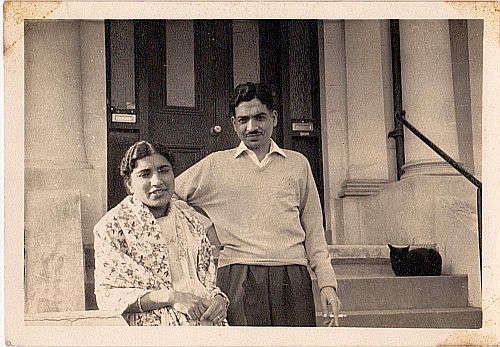
Uma, six months pregnant, 1959. The black lucky cat of the house, and I with my fag in hand.
The power of British Newspapers
Since my wife was pregnant, she was finding it very difficult to carry on working in the factory, where the job required one to stand all the time to work on the machines. She had, therefore, been trying to get a teacher's job in a school - unsuccessfully! There was a hue and cry for the qualified teachers as there was a tremendous shortage of them. Schools were crying for help. All newspapers in London were writing about it. But, my wife was getting all negative response from schools she wrote to for a job.
In desperation, I wrote a letter to the Editor of Manchester Guardian (that's how it was known at that time) saying, that though everyone is talking of shortage of teachers, yet my wife, an MA, is unable to find a school that would offer her the job. The letter was published in the newspaper, quite prominently, the next day.
Wonder of Wonder!
The letters started pouring in from the day after the publication. Literary hundreds. More sympathizing and encouraging. Some offered jobs outside London in Home Counties. Finally, a school in Camden Town itself asked her to come and meet the Headmistress. It was a girl's primary school. After leaving her factory job the next day, she went and met the Headmistress. She offered Uma the job as a teacher for the lower classes. Perfect timing - from9 am to 3 pm, plus free lunch.
Job accepted, starting the same day. Salary of 12 pounds a week. Not bad. The headmistress took her to the classroom and introduced her to the girls, and she left her to handle the class.
Guess what? The whole class consisted of local African girls. Rowdy, abusive, fighting, not interested to listen to the teacher\; and that too a fresh new teacher. The first day when my wife came back home, she almost cried. But, later on, she found ways to manage the class. Things worked out quite well when girls realized she is carrying a baby and needs to retain the job.
During this time she also did a short course in "in infant teaching - 5-7 years old children." Hard Work. During the X-Mas holidays when the school was closed, she worked in Post Office, which used to hire casual workers to cope with the X-Mas mail rush. Extra money was always welcome.
My wife delivers a baby boy
My wife delivered a baby boy on the mid-night of 23 November 1959 at the Royal Free Hospital near the pond at Hampstead.
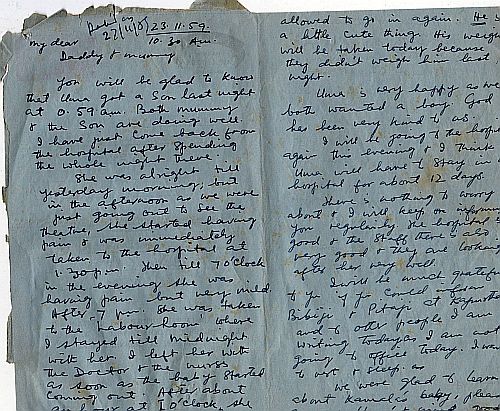
Letter to India about the birth of our son, November 1959.
The other benefit of the Welfare State, after our son was born, was a cash entitlement of 15 pounds for buying a pram and few other items like bed sheets etc. Plus free vitamins and medicines for both mother and the child. Look at the pram being used by us for taking the kid to the amusement Park at Hampstead Heath.
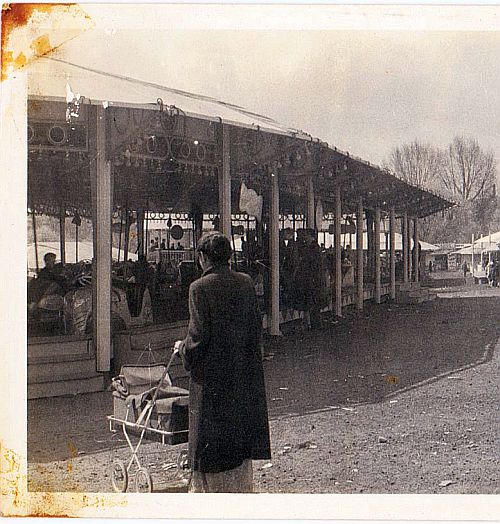
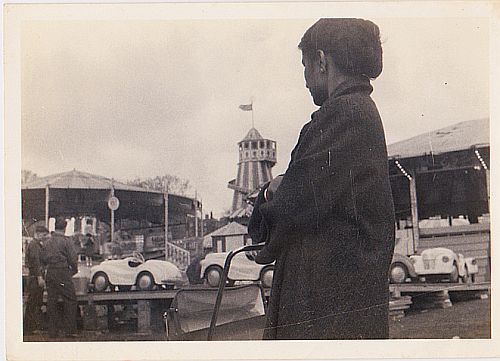
Uma with pram, London, c. 1960
Working on Saturday nights
I had noticed all the men in our building, led by Hassan Mian, used to go out on Saturday nights, and come back pretty late - almost at mid-night. I found out that that they all went to Tottenham, and worked about four hours at night, checking Foot Ball Pool documents. They were earning three pounds an hour!
Next Saturday, they took me along with them. I got the job. In fact, there were hundreds of Indians and Asians working there every Saturday from 8 pm to mid-night. Four hours. Paid ready cash (12 pounds) immediately before leaving the place. How it worked was simple. The results of all the Football League matches used to be known by the Saturday evening. By this time, all the Pool Coupons, filled by hopeful millions hoping to win millions, used to be in from the Post Office. To win the pools, you had to predict Seven Draw Matches.
The job of a checker like me was to go through the bundle of forms given to me, check each penny line and match with the results, and then keep them in different trays, depending on the number of correct or wrong answers. These were then taken away by the supervisor for final check. You had to do a pretty fast job in order to sort literally thousands of forms in 4 hours. Fantastic job, killing the dreams of getting quick millions. Mind you there were winners, always, of - smaller prizes. And overnight millionaires also.
I myself used to fill up 16 lines, each week, with all kinds of permutations and combinations worth one sterling pound. Religiously, for all the years I was in London\; never won a penny. Even later on, in New York, never got anything having spent lot of Dollars on New York Lotto. Luck never smiled on us. We had to work hard for our living. Always.
It was quite hard to work a whole week, five days, and then work hours on Saturday nights. That was the year when the Beatles bursts upon the music stage at Liverpool, with the hit song It's been a Hard Day's Night, and I have been working like a dog!" Made us forget our miseries.
I leave my paid job, and take up unpaid trainee's position in another agency
I decide to leave my job at the old fashioned agency as there was nothing more to learn. After making rounds of various creative shops, one medium size agency, young and modern, offered to take me for three months, without any pay, nor with any promise of a paid job after the three month training period. The word was that "we would review it.'"
I accepted it, as it was all young people. The Managing Director who offered it to me, Mr. Baron Moss (the agency was called Baron Moss Advertising, near Piccadilly Station) had an Indian Art Director, Brandon Pereira working there. I started working with the Number two man, popularly known as Monty, who was handling most of the clients, and office administration. The three months passed pretty fast.
X-mas eve-and I get marching orders from Baron Moss
I cannot forget that X-Mas evening of December 25, 1959, when all the staff of Baron Moss, including me, were celebrating the X-Mas spirit, with drinks flowing and dancing going on in the large office. I was suddenly called by Baron Moss to his office. I was stunned when he told me, during all those celebrations that he was not able to offer me the job and I do not need to come from next day!
Instead of re-joining back the celebrations, I walked to the door to get out from there as soon as possible. Dejected. Didn't know what I was going to do. My exams were coming, and in order to appear I had to be working in an agency!
I became quite calm before reaching home to Uma and the baby. I didn't know how I was going to break the news to her. She had decorated the room\; X-Mas tree, laden with goods for our new baby, and socks, etc. Well that's the time, like in all difficult situations, I recited the mantra given to me by Swamiji before I got married: "Sub Theek Ho Jaiye Gaa (all will be well.)"
The not so invisible helping hand
As I was just putting my coat on and walking out of Baron Moss, on that X-Mas Eve, I was stopped by Monty - the number two man with whom I was working all these three months. He took me his room and said "Look son, (like a lot of English people, he used to call me "son"), cheer up and enjoy the festive mood with your wife and new kid. Take them to the pub and join the celebrations there tomorrow. May be Baron Moss has done a good turn to you."
The next sentence of his made my eyes widen and brought a smile on my face. He told me that, knowing the decision of Baron Moss giving me the marching orders, he had spoken to his friend - the Creative Director of much larger agency. He is prepared to offer you a job immediately, beginning new year-1960. He gave me the letter and asked me to meet him on January 2, 1960 in the New Year.
Come to think of it, I realize that in my life, past and present, it has always been, always, some body that has helped me in difficult time in getting jobs. It was Suresh Mahindra in Bombay. It was the tobacconist of Golders Green to get me in Mac Fisheries. It was the Indian class mate who got me in my first agency job. Baron Moss was perhaps the only place, I got into myself - without salary. Again it was Monty who now was the helping hand who got me into Osborn Peacock Advertising.
In future, back in Bombay, there would be three more helping hands, at different times, to help me out of difficult situations.
We both get new jobs, and a new place to live
I must admire my wife. She took the news of marching orders on X-Mas Eve and the introduction to new job after the New Year very sportingly. Actually believing that to be a blessing in disguise, that I will get a better job in a better agency near Oxford Street-close to Marks &\; Spencer and Piccadilly Circus.
In the meantime, my wife had left the teaching job, and got into BMRB (British Market Research Bureau), in a way related to my profession of advertising. And hardly five minutes away from my future new office.
So we did not let the present circumstances ruin our celebration of newly born son, X-Mas and New Year revelries. We went to our local, with friends. That was the time when a new, mild drink- BABY CHAM - had been launched for ladies, in small bottles. It became an overnight big seller with women folk. We men as usual were on "Usual" (hot draft beer).
Once the New Year celebrations were over, I went to meet the Creative Director of Osborn, Peacock &\; Company. I was immediately taken by his assistant (who also had the habit of calling you "Son"), who said "Come in son, and meet us all".
I was taken to the Board Room with three people already there beside the "son". There was a young, dandy looking man-Mr. Osborn the owner, and an oldish looking man, about 50, slightly plum with a paunch and fair smiling face - obviously the Creative Director known as John Taylor\; and a short plump lady-Chief Copywriter. I understood that Monty from Baron Moss had already spoken to them, yet I handed my application and admission card to the Institute. Osborn approved. I got the offer to start immediately in the Traffic Department under the "come on Son" gentleman. Salary offered 80 pounds a month (not a weekly-wage earner job).
I worked there for almost four years, while attending my classes all the time. Since we both were working in a new jobs, we had to put our son in a nursery, which was part of the hospital where he was born. A number of new parents like us were leaving their children there in the morning, and picking them up in the evening. The nursery part of the Welfare State used to feed the children under the supervision of a qualified doctor. In the evening, my wife used to pick him up, and feed him at home.
He was growing pretty fast, and used to enjoy the weekends with us. Now we needed a better and bigger place. The 1960 London had become what it used to be during the Dickens days. Sudden fog, and it becomes pitch dark at high noon. Soggy, wet and foggy. The place where we lived was becoming little cramp. Moreover I did not need to work on Saturday nights at the Pools. I needed to spend more time at home with our son. We named him Amal - a simple short name so the local residents had no difficulty calling him.

My son, Amal, 2 years old with me at Hampstead Heath-perhaps Sunday morning.
We find another home, right next to Hampstead Heath
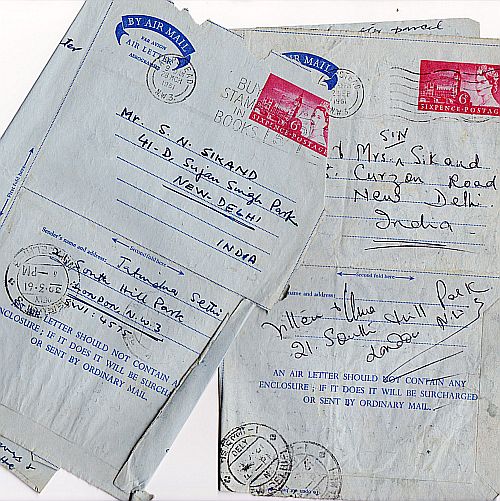
Our South Hill park address
The new address, as can be seen from the letters we wrote back home was 21 South Hill Park-still London NW3. You can notice the date we moved in from the air letter, 30 March 1961. The house belonged to a lady - Mrs Elkind, who worked in the foreign services of BBC. Very liberal, leftist, in fact. She stayed with her daughter upstairs. And we got the ground floor. Two bedrooms, drawing, kitchen, bath and pantry. The back door almost opened on to the Heath. This was an excellent place for a family with a little kid. Moreover the lady was always willing to baby-sit. Very near the Hampstead High Street and the Tube. Lovely mews to walk up to Pond and all the old charm ancient pubs. (I believe they have all been converted to big buildings.) Keats, the poet who wrote the famous Ode to a Nightingale, lived nearby.
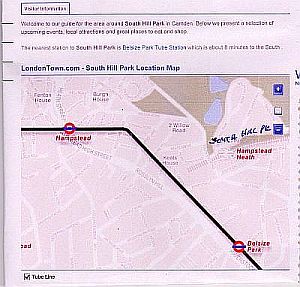
Our house was just touching the Heath.
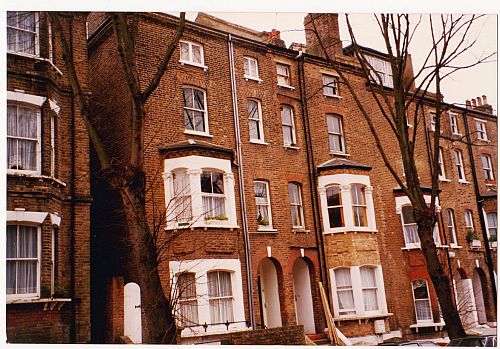
21 South Hill Park -the house with the broom outside. Shot March 1990 by our second son when he visited to see where his elder brother lived as a boy.
The lane South Hill Park was a very unique area. One, the most of the families were young, Leftists and Labour Party Supporters. Many of them had mixed marriages - English ladies married to Africans. And all had small children. We were instantly accepted in the group, and became active members. We marched with them, pushing our pram like others, to Trafalgar Square in "Ban the Bomb' agitation-a very popular movement at that time.
Measles Parties
Since the lane had families, all with growing up children, there used to be Measles Parties. If one child in the area got measles, the family would invite all the children of the lane to their house for a Measles Party. The idea was that all the children get measles at the same time, so the problem is not spread to a longer period.
Time passed quite happily. Spending the weekends with our son and friends at the old pubs. Two of the most famous pubs were Spaniards Inn-believed to have been the haunts of both Dickens and Keats (who used to live nearby) The other was the Freemason Arms.
I become a Member of the Institute of Practitioners of Advertising
While working at Osborn-Peacock, I passed my Membership Exam of the Institute, and was admitted as a Member of the Institute of Practitioners of Advertising, London.

Now I started looking for jobs in manufacturing companies. I got a call for an interview from a company called Fisons International, at Felix Stone, manufacturers of medicines, chemicals, etc. I took a train and went to meet them. They had arranged for my stay and return. The HR Manager, introduced me to another man-a very handsome, well dressed Greek. He introduced himself to me and told me that his name was A D Mango (A D stood for some long Greek names). And he animatedly pointed out "Mango, the fruit". He interviewed me for about 30 minutes and offered to hire me.
GUESS AGAIN?
He was the Managing Director of Rallis India Limited, a very old and large company in Bombay, India. Rallis had joined hands with Fisons, England along with Tata's in India.
I was told that the company would fly me and my family back to Bombay immediately, and I would start work as soon as I reached there. I was given a good salary (so I thought, being 1965) plus an apartment in Malabar Hills, one of Bombay's poshest localities. As far as our stuff in London was concerned, Fisons would get it packed and sent to India by air, to follow us.
In December 1965, we flew back. I went to Bombay to report for work. My wife and five year old son went off to Delhi to her parent's home. At this time, she was, carrying a second child. My wife delivered a second son on March25, 1965 in Delhi, when I was travelling to visit the various offices of Rallis in India. I worked in Rallis at Bombay till 1968.
THE END!
So Ends This Part Of The Journey Of Our Lives.
(Life back in Bombay, India, after almost six years in London, is a part of another journey.)
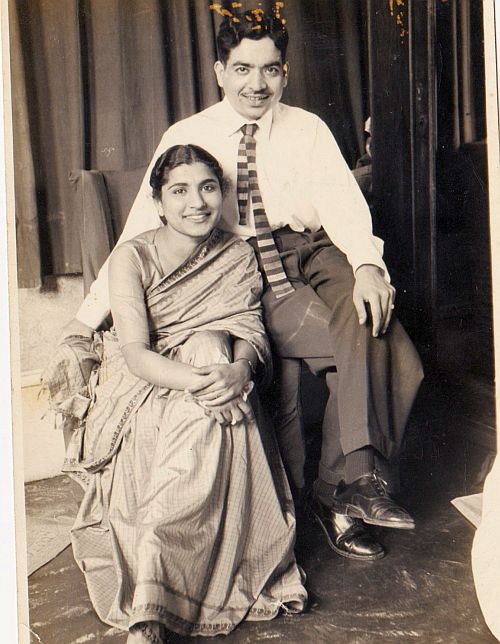
Jatinder and Uma Sethi, 1966

Jatinder and Uma Sethi, June 2014, in Gurgaon.
_______________________________________
© Jatinder Sethi 2014
Editor's note: I approve all comments written by people. The purpose of approval is to prevent unwanted commetns, inserted by bots, which are really adverstiments for their products.
Comments
Add new comment